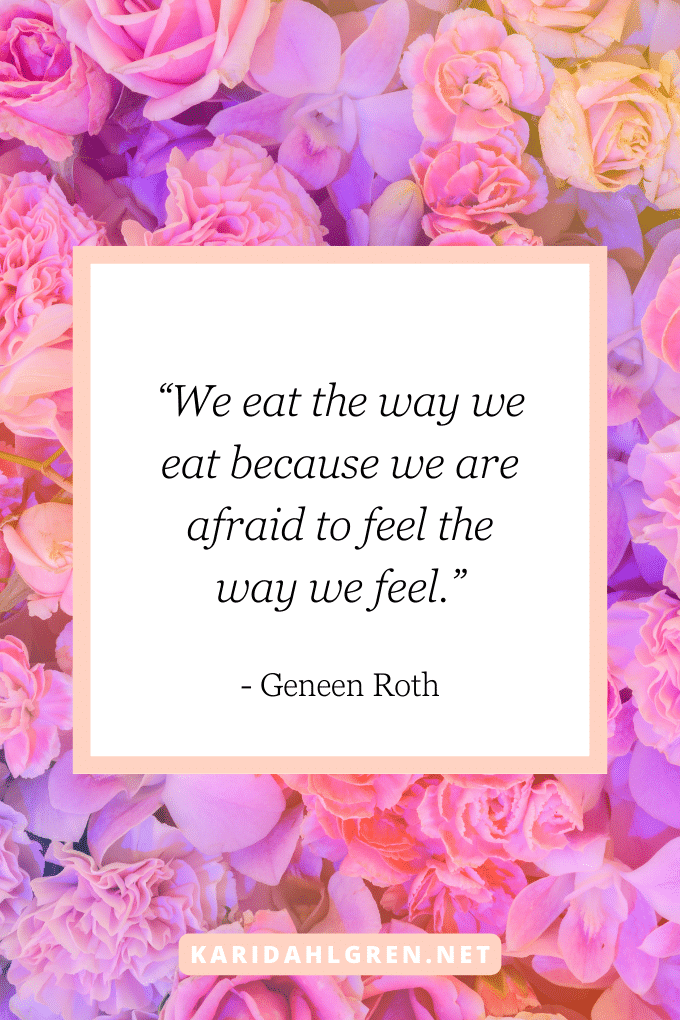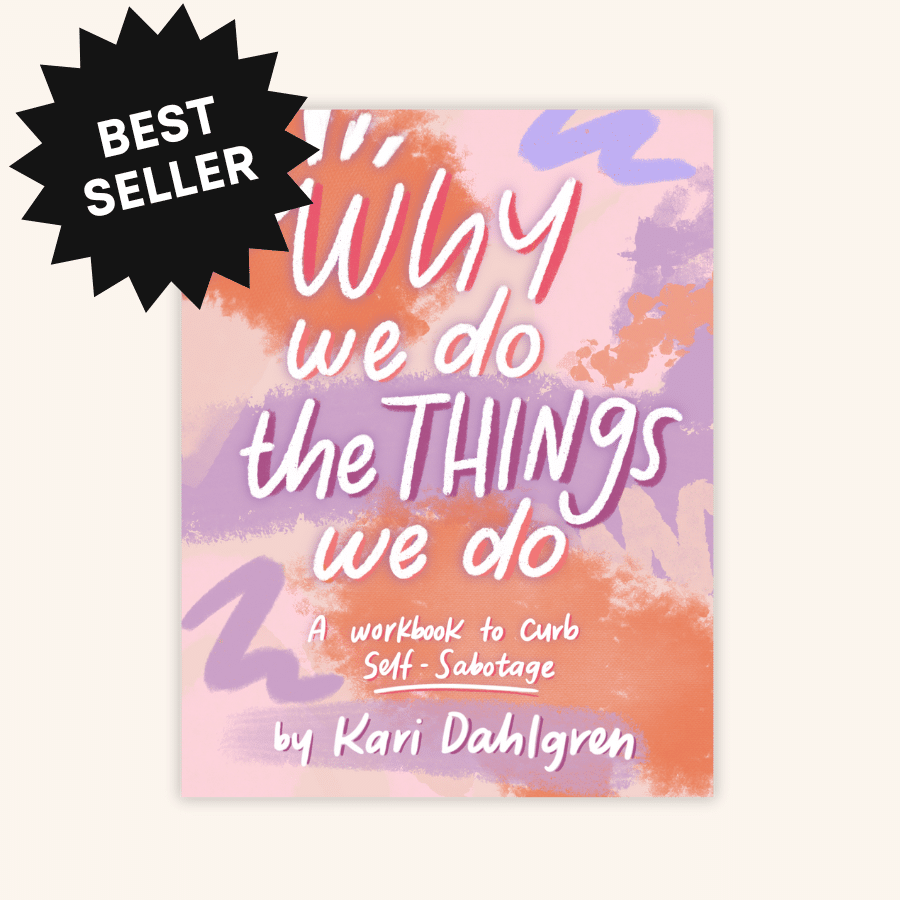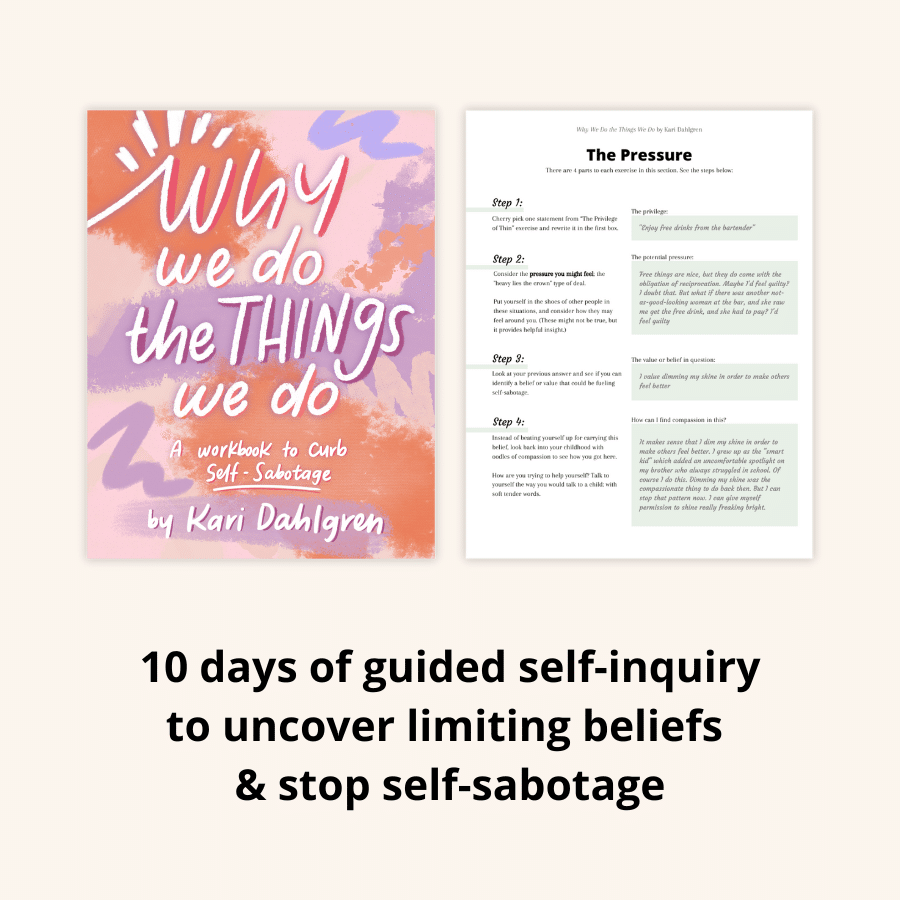
If you want to stop overeating, I have tons of advice on how to address it from a psychological angle. After all, this is the home of Psycho-Spiritual Wellness: a path to stop overeating rooted in psychology and spirituality, not dieting.
I encourage you to read through my others posts about the psychological reasons for overeating and also the psychology of weight loss. Those are two of my most popular and comprehensive articles.
Here’s what they have in common: Whenever there’s a desire to eat when you aren’t hungry, there’s a feeling that you’re not willing to feel. In other words, the #1 reason why we feel stuck in the binge eating / night eating / overeating cycle is avoiding negative emotions.
A cornerstone of my personal philosophy to stop binge eating is emotional tolerance: your ability to feel uncomfortable without getting swept away by it. The idea isn’t very magnetic, but if you stick with me, it could be the revelation you need to finally reach your natural weight—which is just one of many natural settling points, by the way.
So, let’s get nice and uncomfortable.
The Uncomfortable Truth
Let’s use an analogy to better understand our relationship with food: the classic iceberg analogy. While this analogy is often reserved for explaining emotions, doesn’t that make it all the more fitting for what I’m about to explain?
To back up for a second, let’s explore the analogy of the ‘anger iceberg.’
![the emotion iceberg: [pointing to surface of iceberg] secondary emotion: anger [pointing to bottom of iceberg] primary emotion: fear, sadness, hurt, insecurity, anxiety](https://karidahlgren.net/wp-content/uploads/2023/07/the-uncomfortable-truth-1.png)
In psychology, anger is known as a ‘secondary emotion’ which means there is another emotion behind it. Anger would be the ‘secondary emotion’ and the tip of the iceberg visible from the surface. Some other emotion – like fear, sadness, loneliness, hurt – would be the ‘primary emotion’ behind the anger and therefore the mass of iceberg underneath the surface. Now, how does this relate to overeating?
In my list of reasons for overeating, you’ll notice there are many really good reasons for turning to food when we aren’t hungry. Most of these reasons are ‘secondary motivations.’ This means there’s another ‘primary motivation’ sitting underneath the surface.
For example, in my other article, I mention that people pleasing can cause us to eat when we aren’t hungry, especially in social situations where others are eating. In this example, people pleasing is the secondary motivation. What would be the primary?
It’s different for everyone. Some people might eat while others are eating because they don’t want to disappoint the chef or host. The primary motivation here is an unwillingness to feel the hurt of hurting someone else’s feelings—even when it’s appropriate.
![the overeating iceberg: [pointing to surface of iceberg] secondary motivation: I eat because others are eating [pointing to bottom of iceberg] primary motivation: I am terrified of rejection if I hurt the host's feelings](https://karidahlgren.net/wp-content/uploads/2023/07/the-uncomfortable-truth-2.png)
It never feels good to hurt someone else’s feelings, and most of us have a knee-jerk reaction to avoid it at all costs. But when it affects your health, it’s best to set boundaries and gently explain to others why you’re choosing not to eat (because you’re not hungry). If it hurts their feelings, that’s on them, not you.
[Side note: People pleasing is a huge roadblock standing in the way of most people on the path to stopping compulsive eating. I have a whole lesson dedicated to this topic in my online course, Food Normal.]
The #1 Tool to Stop Overeating: The Stop, Drop, & Feel®
The emotions that drive compulsive eating are never obvious. When I first started doing the Stop, Drop, & Feel®, I had a craving for sweets after lunch even though I wasn’t hungry, and I brushed it off as addiction to sugar.
Yet, when I stopped to feel my feelings, I burst into tears. I was sad and I didn’t even know it. That’s why I urge you to do the Stop, Drop, & Feel even if you already think you know how you feel. You just might be surprised.
Here’s my video on the Stop, Drop, & Feel where I talk about this experience and explain how to use the tool:

The Stop, Drop, & Feel method aims to help you overcome compulsive eating by addressing the uncomfortable emotions that trigger overeating patterns.
Here are the steps to do it:
- Stop: The moment you’re about to reach for food when you’re not actually hungry, stop and pause. Promise yourself that you can still eat that specific food after the “Stop, Drop, & Feel” process if you still want it. This aspect of permission gives you the ability to actually pause a binge.
- Drop: After stopping, if possible, move into a different room and set a timer for just 2 minutes. Then, drop into your body. Become curious about what you’re feeling at that moment.
- Feel: Now, allow yourself to feel what you’re feeling. Do not intellectualize your emotions or resist them, as that can make them grow stronger. Instead, spend the two minutes sitting still with your emotions. Allow yourself to feel them fully.
The purpose of this process is to create emotional awareness and emotional tolerance, providing a space where you can sit in the groundlessness of discomfort. It is a really hard sell! Who wants to sit in their own edginess? Not me! But the effectiveness of this tool makes it worth it. The Stop, Drop, & Feel is powerful enough to stop a binge in its tracks.
Avoidance of Emotion Looks Different for Everyone
Also, it’s important to peel back as many layers as possible. For example, I used to say that hedonic eating was the exception to the rule because it’s more about chasing pleasure than avoiding pain. But I’ve come to realize that, even when we are compulsively chasing pleasure, there’s always some sort of pain that we’re running from.
For example, if you have a really demanding job that makes it hard to find any time for joyful hobbies, it will be very easy to slip into hedonic eating tendencies. You may head straight to the pantry after work to mindlessly munch on chips or sweets even if you aren’t hungry. It is an easy way to fill your joy bucket.
In this example, reaching for the chips or sweets is hedonic eating because it’s a pursuit of pleasure; especially when pleasure is lacking everywhere else. Yet, at the same time, it’s also plain ol’ compulsive eating because a really demanding job that provides no joy sounds like a real drag. Reaching for food when you aren’t hungry could be an attempt to buffer that pain.
If we don’t stop to feel our feelings, we end up buffering with food. This is why they say trapped emotions lead to weight gain. Unless we take the time and effort to process our emotions, we will continually ‘stuff them down’ with food.
Feel Your Feelings
![[image of brain] just like you can "get good" at tying your shoelaces, you can "get good" at feeling uncomfortable](https://karidahlgren.net/wp-content/uploads/2023/07/the-uncomfortable-truth-3.png)
Our brains are wired to avoid pain. It’s called our negativity bias. Our brains are also wired to carry out the tasks that we practice most frequently on autopilot. It’s called neuroplasticity: the mechanism the brain uses to rewire itself to make frequent tasks easier to execute.
Neuroplasticity is why you can tie your shoe laces in three seconds whereas it takes a toddler three minutes. It’s also the reason why you can ‘space out’ while driving and ‘wake up’ 3 minutes later at a completely different stop light. Did you run any reds while your mind was wandering? Likely not. We have practiced the task of hitting gas at green lights and hitting the brake at red lights that we likely do it on autopilot, even when our minds are completely somewhere else.
This is why it takes so much self-awareness to stop compulsive eating. If we have been practicing avoiding our emotions with food for many years – often decades – then we are likely doing it on autopilot. It takes enormous strength to rewire this habit.
But rewire it, you can. My Stop, Drop, & Feel technique is all you need to accomplish this. It asks you to stop yourself in the precise moment when you want to eat when you aren’t hungry to feel your feelings. As I mentioned earlier, this practice helps you develop emotional awareness and emotional tolerance.
When you practice sitting still with uncomfortable emotions, you develop tolerance for them. You “get good” at feeling bad. This is a priceless skill! It is what helps us stop eating when we aren’t hungry, even if we’ve had a really bad day.
A Plea for “Feeling Uncomfortable”
Feeling uncomfortable is a skill. When you get better at it, you will naturally stop turning to food when you aren’t hungry because you won’t need the buffer.
The Stop, Drop, & Feel is the tool that will help you get there. It asks you to sit in the edgiest moment possible, but only for two minutes. When we practice this day after day, we strengthen our ability to stay with ourselves when life gets uncomfortable instead of abandoning ourselves by overeating.
Again, I know this concept is far from sexy, but it will help you reach a place of enormous inner strength. And there’s nothing sexier than living your most authentic life, in sync with your emotions and intuition.




Hello, I really enjoy your newsletters I found this article on pintrest I have been really relating to everything I thought I was the only one who suffer from this and that I was crazy. I have not received the free e book even though I signed in and would really love to have a copy of this.
Thank you so so much
Hi Candelaria! I am so glad this helped you feel validated. It’s so important and helpful to know that you’re not alone. I’ve forwarded the ebook to you personally 🙂 go ahead and check your inbox!